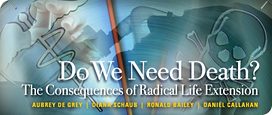I begin by noting that Daniel Callahan at age 77 admits that old age “is not the best stage of life.” He also suggests—and I agree–that adolescence wasn’t so hot either. Of course, there is a difference—an adolescent can look forward to waxing powers and a future of hope. Being old is certainly “not the best stage of life” because an old person dreads waning vigor and the all-too-speedy approach of oblivion.
Here are a few brief responses of Callahan’s reaction essay. He complains that pro-longevity proponents argue that life extension “would make our lives a kind of heaven on earth.” Talk about a pot calling a kettle black! Callahan and his pro-mortalist cohorts can only see radically longer healthy lives producing dystopias filled with people afflicted with endless ennui. “We might get tired of it all or bored,” he writes.
Or we might not. Let’s proceed with the pro-longevity project and find out. If it turns out that most people find it unbearable to face the prospect of hundreds of healthy years, then they can always stop taking the anti-aging treatments and let nature take its usual appalling course. But as even the President’s Council on Bioethics acknowledged: “If effective age-retardation technologies became available and relatively painless and inexpensive, the vast majority of us would surely opt to use them, and they would quickly become popular and widely employed.”[1]
Obviously then Callahan must regard the hundreds of millions of his fellow human beings who would take advantage of cheap effective age-retardation treatments as being somehow delusional—they don’t know their own best interests. I suppose that’s possible, but it is far more likely that Callahan is especially deep in thrall to what de Grey calls the “pro-aging trance.” Let’s turn on its head the infamous argument by Leon Kass, the former head of the President’s Bioethics Council, that we should rely on our gut feelings to reject biotechnological advances.[2] The fact of near-ubiquitous human yearning for longer healthier lives should serve as a preliminary warrant for pursuing age-retardation as a moral good.
At the end of his essay, Callahan writes: “I really wish we would be told, when the great day arrives and we have dozens, maybe hundreds of years ahead of us, exactly how it would all work.” Well, I wish I knew too, but the plain unvarnished fact of the matter is that humanity advances by trial and error. Even the smartest people cannot figure out how scientific and technological advances will play out over the next few decades, much less centuries. In 1960 the optical laser was described by its inventor as an invention looking for a job. By 2005 ubiquitous lasers routinely cut metal, play CDs, reshape corneas, carry billions of Internet messages, remove tattoos, and guide bombs. It is likely that age-retardation technologies will develop incrementally. So humanity will have lots of opportunities for course corrections as we go along.
The very good news is that the history of the last two centuries has shown that technological progress has been far more beneficial than harmful for humanity. I see no reason why age-retardation will not be another, albeit very big, step along that beneficial trend line. We should all have the right to choose to use or not use new technologies to help us and our families to flourish. If our descendants don’t breed like us, feed like us, or need like us, then that’s because they will have decided that they have better alternatives. Is humanity ready for radically longer lifespans? We’re about as ready as we’ll ever be.In other words, yes.
Notes
[1] Beyond Therapy: Biotechnology and the Pursuit of Happiness, President’s Council on Bioethics.
[2] Leon Kass, “The Wisdom of Repugnance,” New Republic, June 2, 1997.

